Catholic Church

Pope Francis launched the jubilee of mercy on Dec. 8 with the opening of the Vatican’s holy door, joined by his predecessor Pope Emeritus Benedict XVI, and thousands of pilgrims gathered in St. Peter’s Square, surrounded by heavy security.
“This extraordinary year is itself a gift of grace,” Francis told the faithful gathered at the Vatican.
“To pass through the holy door means to rediscover the infinite mercy of the Father who welcomes everyone and goes out personally to encounter each of them.”
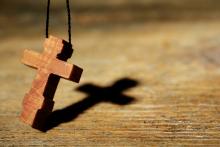
The Roman Catholic Diocese of Duluth announced on Dec. 7 that it had filed for bankruptcy protection following a jury verdict last month that held the Minnesota diocese responsible for more than half of an $8.1 million judgment on behalf of a victim of sex abuse by a priest.
The Chapter 11 filing makes Duluth the 13th of nearly 200 U.S. Catholic dioceses to file for bankruptcy since 2004 because of the clergy sex abuse scandals. Regional organizations of two religious orders have also sought bankruptcy protection.
The Duluth award was one of the highest single monetary compensations for a survivor of clergy abuse, experts said. It was made possible thanks to a Minnesota law that lifted the statute of limitations on civil claims for sex abuse.
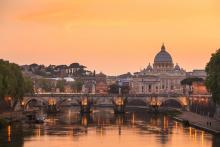
In the Catholic Church, a jubilee — or a holy year — is a religious event that involves the forgiveness of sins, as well as reconciliation. But the idea of a jubilee dates back to the Bible: “And you shall sanctify the fiftieth year, and proclaim freedom throughout the land for all who live on it,” Leviticus 25:10. For the ancient Israelites, the jubilee was a time properties were returned to their original owners or legal heirs, slaves were set free, and creditors were barred from collecting debts.
Pope Boniface VIII in 1300 declared the first Christian jubilee, beginning with the opening of the Holy Door, an entrance to St. Peter’s Basilica, usually blocked, through which pilgrims can enter. Other holy doors are also opened for this jubilee in Rome and around the world for the first time; the year ends when they are closed.
On Nov. 29 Pope Francis opened a door at the cathedral in Bangui, the capital of the Central African Republic, as a symbolic start to the Holy Year.
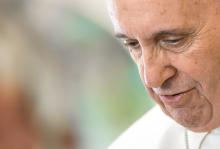
Pope Francis wrapped up his six-day trip to Africa in the war-torn Central Africa Republic on Nov. 30 by warning that religious conflicts are spawning civil war, terrorism, and suffering throughout the continent.
“Together we must say no to hatred, to revenge and to violence, especially violence perpetrated in the name of a religion or of God himself,” the pope said in Bangui, the capital.
“Together, we must say no to hatred, to revenge and to violence, particularly that violence which is perpetrated in the name of a religion or of God himself. God is peace, ‘salaam,’ ” the pope said, using the Arabic word for peace.

Throngs of Roman Catholics are expected to greet Pope Francis when he visits East Africa this week.
But the Rev. Anthony Musaala won’t be a part of the official welcoming delegation.
Two years ago, Ugandan Archbishop Cyprian Lwanga suspended Musaala indefinitely — barring him from administering the sacraments — when Musaala wrote an open letter that challenged his priestly vows of celibacy, condemned sexual abusers among the clergy, and criticized priests who father children and abandon them.
Lwanga said the letter “damages the good morals of the Catholic believers and faults the church’s teaching.”

An Italian nun who shot to global fame by winning The Voice of Italy talent show is set to star in a stage production of the musical Sister Act, which opens here in time for Christmas.
Cristina Scuccia, better known as “Suor Cristina” (“Sister Cristina”), wowed judges and audiences last year with her soulful renditions of pop classics by artists such as Alicia Keys. Appearing on stage in her habit, silver cross swinging as she swayed, Scuccia became the unlikely winner of the Italian version of The Voice and signed a record deal with Universal.
The 27-year-old is now set to take the next step in her career. The stage production of the 1992 movie, in which Whoopi Goldberg played a singer hiding out in a convent after witnessing a murder, will open on Dec. 10 at Rome’s Brancaccio Theater.

The nation’s Catholic bishops on Nov. 17 passed an updated guide for Catholic voters ahead of next year’s elections, but only after airing unusually sharp disagreements on how much they can, and should, adjust their priorities to match those of Pope Francis.
More than any other item on the agenda of the bishops’ annual meeting here, the debate over the lengthy voter guide, called “Faithful Citizenship,” revealed deep divides among the bishops and provided a snapshot of the extent of the “Francis effect” on the U.S. hierarchy.
In the most impassioned objection to the voter guide, San Diego Bishop Robert McElroy took the floor to argue that the document — which was a reworking of an 84-page treatise first written in 2007 — should be scrapped because it did not reflect the way that Francis has elevated the battle against poverty and for the environment as central concerns for the Catholic Church since his election in 2013.
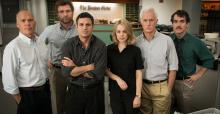
Early in the film Spotlight, about the Boston Globe investigative reporting team that exposed the decades-long cover-up of sex abuse by Catholic church leaders, a Globe reporter is shown at Mass with her grandmother. The priest, launching his homily, says, “Knowledge is one thing. Faith is another.”
In a simplistic film, this binary statement might set the tone for a black-and-white portrait of journalists as pure heroes and people of faith as solely hypocrites and worse. But Spotlight works with characters not caricatures; not one-dimensional heroes and villains, but real people who sometimes choose expediency and sometimes courage. No one is shown to be flawless, not even the reporters and editors who do great good in bringing to light systemic crimes.
But the movie does illustrate quite clearly one tension between knowledge and faith: The guardians of institutions, including churches, can fear knowledge to the point of pathology.

Pope Francis made a whirlwind trip to Tuscany on Nov. 10, during which he addressed immigrant workers, called on Italian bishops to shun power, and celebrated Mass with thousands of followers in Florence’s soccer stadium.
Francis started his packed, daylong schedule with a helicopter flight to Prato, known for its textile industry and large Chinese community. Crowds waving the Vatican’s yellow and white flag met him on his arrival.
The pope called for an end to labor exploitation, addressing the deaths of seven Chinese workers in a nighttime factory fire in 2013.
“It is a tragedy of exploitation and of inhumane conditions of life. And this is not undignified work,” he said.

A Honduran cardinal who is a top adviser to Pope Francis said he expects the pontiff to travel to Mexico’s border with the U.S. when he visits that country in February.
“I think it’s almost sure he will go to the border. I don’t know which cities,” said Cardinal Oscar Rodriguez Maradiaga, who heads a special council of nine cardinals that Francis set up in 2013 to advise him on reforming the Vatican.
“Knowing him, he will go … I don’t know yet where,” Rodriguez said in an interview on Nov. 3 before taking part in a Fordham University panel on “Laudato Si’,” the pope’s groundbreaking encyclical on the moral duty to protect the environment.
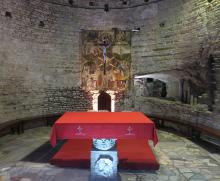
The document would become known as the Pact of the Catacombs, and the signers hoped it would mark a turning point in church history.
Instead, the Pact of the Catacombs disappeared, for all intents and purposes.
It is barely mentioned in the extensive histories of Vatican II, and while copies of the text are in circulation, no one knows what happened to the original document. In addition, the exact number and names of the original signers is in dispute, though it is believed that only one still survives: Luigi Bettazzi, nearly 92 years old now, bishop emeritus of the Italian diocese of Ivrea.

Pope Francis’ visit to the Kenyan capital of Nairobi Nov. 25–27 will bring healing and reconciliation to the East African nation that has suffered key setbacks in the recent past, senior bishops here say.
Kenya, a country with 14 million Catholics, recently announced the theme of the papal visit: “Stand firm and be strong.” Organizers expect nearly 1.5 million people to attend the papal Mass on Nov. 26 in Nairobi; there are nearly 4 million Catholics in the Archdiocese of Nairobi.
The pope’s Nov. 25-30 pilgrimage to Africa, also includes travel to Uganda and the Central African Republic. But in remarks Sunday to a crowd of faithful in St. Peter’s Square, Francis raised the possibility that security risks could cause the Central African Republic leg of his trip to change or even be scrapped.
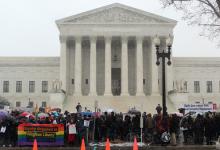
Sixteen months after ruling narrowly that companies with religious objections cannot be forced to pay for employees’ contraceptives, the court faces a chorus of cries from religious charities, schools, and hospitals seeking to get out of the birth control business altogether.
The justices are scheduled to review several petitions Friday asking them to overturn federal appeals court decisions that would force the non-profit groups to opt out of the “contraceptive mandate” included in the Affordable Care Act, rather than receiving the blanket exclusion granted churches and other solely religious institutions.
If they agree to hear one or more of the cases, it will mark the fourth time in five years that President Obama’s prized health care law has come before the high court. And it will put the battle between religious freedom and reproductive rights front-and-center in next year’s presidential race.
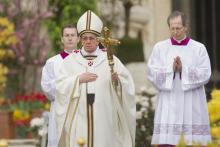
The Vatican announced Oct. 28 that Pope Francis will issue a document about the family as a follow up to the recently-concluded Synod on the Family, according to America magazine.
The Synod on the Family, a meeting of 270 bishops which discussed, among other things, communion for divorced and remarried Catholics and pastoral approaches to the LGBT population, lasted three weeks and ended Oct. 25. Pope Francis will release an “apostolic exhortation,” a type of papal document commonly released after a synod, which is one step down in authority from an authoritative papal encyclical. “Laudato Si,” Pope Francis’ recent writing on the environment, was an encyclical.

Pope Francis named two new archbishops in Italy on Oct. 27, seen as strategic appointments for the pontiff’s push to create a “poor church.”
Matteo Maria Zuppi will leave his position as an auxiliary bishop of Rome to take up his new post in Bologna, in central Italy. And Corrado Lorefice, a parish priest in the Sicilian city of Noto, has been named archbishop of Palermo.
Both are relatively young to receive such high office; Zuppi turned 60 this month, while Lorefice has just celebrated his 53rd birthday. But more importantly, the new archbishops have adhered to the pontiff’s wish to prioritize caring for the poor.

My rabbinic colleague, David Saperstein, the U.S. ambassador-at-large for international religious freedom, issued a “glass half full” report earlier this month, noting that “… over the last several years there’s been a steady increase in the percentage of people who live in countries that … have serious restrictions on religious freedom.”
At the same time, he noted, “we’ve seen enormous expansion of interfaith efforts on almost every continent to try and address the challenges.”
Much of that “enormous expansion of interfaith efforts” can be traced to the historic Nostra Aetate (Latin for “In Our Time”) Declaration that the world’s Catholic bishops adopted 50 years ago at the conclusion of the Second Vatican Council.
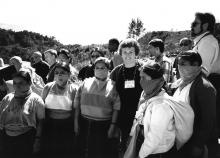
Veteran Catholic writer Tom Roberts thought he knew Sister Joan Chittister — the maverick Benedictine nun who dares speak her mind to her church.
He didn’t.
When Roberts, editor at large for the National Catholic Reporter, went to interview her three years ago in Erie, Pa., at the community where she entered religious life at age 16, a secret she’s held for a lifetime came to light.
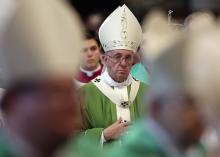
The most significant and contested gathering of Roman Catholic bishops in the last 50 years formally ended on Oct. 25 after three weeks of debate and dispute, but the arguments over who “won” and who “lost” are only beginning.
The synod of 270 cardinals and bishops from around the world was the second in a year called by Pope Francis to address how and whether Catholicism could adapt its teachings to the changing realities of modern family life. Traditionalists had taken a hard line against any openings, especially after last October’s meeting seemed to point toward possible reforms.
While the delegates made hundreds of suggestions on a host of issues, two took center stage, in part because they represented a barometer for the whole question of change: Could the church be more welcoming to gays, and was there a way divorced and remarried Catholics could receive Communion without an annulment?
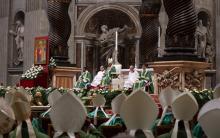
The overriding interest in the global meeting of Roman Catholic bishops that finishes here on Oct. 25 has centered on whether the churchmen will actually do anything in the end — as in vote to make changes in church doctrines or policies — or leave well enough alone.
In reality, the gathering of 270 bishops from around the world, called a synod, has no authority to legislate doctrinal or other changes, and wasn’t expected to try anything that bold anyway.
Its real purpose — thanks to reforms instituted by Pope Francis — is to discuss issues openly and frankly, and to advise the pontiff about what they think the church ought to do about the challenges facing families today, or, as is likely the case for this divided synod, to kick the hard questions upstairs for him to decide.

The rows of seats in the synod hall, where Catholic bishops are meeting to discuss family issues, are filled with bishops and cardinals — all male. To find any women, look to the back of the room.
The women’s distance from the heart of the synod hall reflects fears raised by women’s groups that their participation is a mere token on the Vatican’s part.
There are 270 bishops and cardinals participating in the synod and voting on its outcome. A number of other participants, including lay couples and representatives from other churches, have been invited to give their opinions but will not be able to make decisions on the final text. That includes more than two dozen women who have been called to present their views.